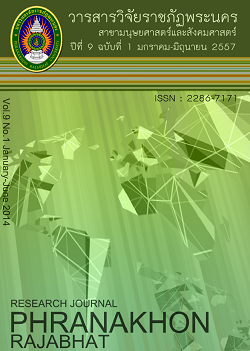ยุทธศาสตร์การบริหารโครงการ EP ของโรงเรียนมัธยมศึกษาในเขตกรุงเทพมหานคร: ศึกษากรณีโรงเรียนในสังกัดสำนักงานคณะกรรมการการศึกษาขั้นพื้นฐาน กระทรวงศึกษาธิการ
Main Article Content
บทคัดย่อ
การวิจัยครั้งนี้มีวัตถุประสงค์เพื่อ1) ศึกษาสภาพปัญหาการบริหารโครงการ EP 2) ศึกษาระดับปัจจัยที่เกี่ยวข้องกับการบริหารโครงการ EP และ 3) พัฒนายุทธศาสตร์การ บริหารโครงการ EP โดยใช้ระเบียบวิธีวิจัยเชิงคุณภาพและเชิงปริมาณ เก็บรวบรวมข้อมูล เชิงคุณภาพโดยการสัมภาษณ์แบบเจาะลึกผู้ให้ข้อมูลหลักจำนวน 27 คน วิเคราะห์ สภาพแวดล้อมภายนอกและภายใน เก็บข้อมูลด้วยแบบสอบถามกลุ่มตัวอย่าง จำนวน 169 คน การตรวจสอบข้อมูลใช้วิธีการสามเส้า การวิเคราะห์ข้อมูลด้วยการวิเคราะห์เนื้อหา การวิเคราะห์ข้อมูลทางสถิติ ใช้ค่าร้อยละ ค่าเฉลี่ย และส่วนเบี่ยงเบนมาตรฐาน
ผลการวิจัยพบว่า
1. สภาพปัญหาการบริหารโครงการ EP สภาพแวดล้อมภายนอก ได้แก่ การเมือง และกฎหมาย กระทรวงศึกษาธิการให้ความสำคัญในการบริหารงานที่มีรูปแบบผสมผสาน ระหว่างยุทธศาสตร์ของภาครัฐ ภาคเอกชน และภาคประชาชน ส่วนสภาพแวดล้อมภายในการบริหารโครงการEP จัดการเรียนการสอนในบริบทความเป็นไทยผสมผสานกับความเป็น สากล เน้นที่หลักสูตรและการเรียนการสอนเป็นสำคัญ
2. ระดับปัจจัยการบริหารโครงการ EP แบ่งเป็น 3 ปัจจัย คือ 1. ปัจจัยสภาพแวดล้อมภายนอก (ประเทศ) ได้แก่ การเมือง และกฎหมาย เศรษฐกิจ สังคม และวัฒนธรรม และเทคโนโลยี อยู่ในระดับมากที่สุด 2. ปัจจัยสภาพแวดล้อมภายนอก (กระทรวงศึกษาธิการ) ได้แก่ บุคลากร งบประมาณ และ เทคโนโลยี อยู่ในระดับมากที่สุด และ 3.ปัจจัยสภาพแวดล้อมภายใน (การบริหารโครงการ EP) ได้แก่ ผู้บริหาร บุคลากร หลักสูตรการเรียนการสอน นักเรียน/ผู้เรียน ผู้ปกครอง/ ชุมชน และการบริหารงบประมาณและทรัพยากรโครงการ EP อยู่ในระดับมากที่สุด
3. ยุทธศาสตร์การบริหารโครงการEP ให้มีประสิทธิภาพได้แก่ 1) การสร้างความ เป็นเลิศทางความรู้คู่คุณธรรม 2) การพัฒนาบุคลากรทั้งครูไทยและครูต่างชาติสู่ครูมือ อาชีพ 3) การพัฒนาหลักสูตรให้เหมาะสมกับการเปลี่ยนแปลง 4) การสร้างความสัมพันธ์ การมีส่วนร่วมของชุมชนและผู้ปกครอง 5) การสร้างภาคีเครือข่ายในประเทศ ระหว่าง ประเทศและนานาชาติ 6) การพัฒนาระบบบริหารการจัดการที่ดีและเทคโนโลยีสารสนเทศทางการศึกษา
STRATEGIC PLAN FOR ENGLISH PROGRAM (EP) MANAGEMENT OF SECONDARY SCHOOLS IN BANGKOK: A CASE STUDY OF SCHOOLS UNDER THE OFFICE OF THE BASIC EDUCATION COMMISSION, MINISTRY OF EDUCATION
The purposes of this research were 1) to analyze problems of English Program management in secondary schools of Bangkok metropolis area, 2) to study the factors affecting English Program management in the secondary schools; and 3) to develop strategies for English Program management in the secondary schools Bangkok metropolis. The research methodology included qualitative and quantitative analysis; the instrument employed for collecting qualitative data was in-depth interviews. The data were collected from 27 key informants. The data about external and internal environments were collected from 169 informants through questionnaires. The data were analyzed by using SWOT analysis, and data triangulation and content analysis were used for the qualitative analysis. For the quantitative analysis, data collected through a questionnaire were analyzed by using percentage mean and standard deviation
The research results were as follows
1. External factors related to the nation’s legal and political domains have made people more aware of the need to study English and the English Program. There is a need for the Ministry of Education to focus on a well – integrated management model between governmental, private, and public strategies which can be evaluated for in terms of the effectiveness of the development of the EP project at every stage. English Program management, there is a need to focus on curriculum and instructions and combine the education in the Thai context with international education standards.
2. The key issues in English Program management were determined to find out 1) national external factors relating to the political and economic climate, the social and cultural environment, and technology; 2) the most important external factors relating to the Ministry of Education level were personnel, budget, and technology; and 3) the most important factors at the English Program were related to administrators, personnel, curriculum and instruction, students, parents and community, budget and resources management.
3. Management strategies for the English Programs in Secondary Schools in Bangkok include 1) nurturing of knowledge and morality, 2) personal development of both Thai and foreign teachers as professionals, 3) developing curriculum to suit changing conditions, 4) strengthening the cooperative relationship between parents and the community, 5) creating a social network among domestic and international learners, and 6) developing good governance and the use of information technology in education.
Article Details
บทความที่ได้รับการตีพิมพ์เป็นลิขสิทธิ์ของมหาวิทยาลัยราชภัฏพระนคร
ข้อความที่ปรากฏในบทความแต่ละเรื่องในวารสารวิจัยราชภัฏพระนครเล่มนี้เป็นความคิดเห็นส่วนตัวของผู้เขียนแต่ละท่านไม่เกี่ยวข้องกับมหาวิทยาลัยราชภัฏพระนคร และคณาจารย์ท่านอื่นๆในมหาวิทยาลัยฯ แต่อย่างใด ความรับผิดชอบองค์ประกอบทั้งหมดของบทความแต่ละเรื่องเป็นของผู้เขียนแต่ละท่าน หากมีความผิดพลาดใดๆ ผู้เขียนแต่ละท่านจะรับผิดชอบบทความของตนเองแต่ผู้เดียว


